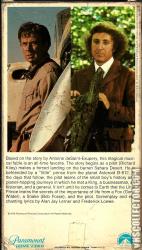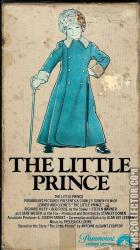The Little Prince
Catalog Number
8017
-
Primary Distributor (If not listed, select "OTHER")
Catalog Number
8017
Primary Distributor (If not listed, select "OTHER")
Release Year
Country
N/A (NTSC)
N/A | N/A | N/A
N/A | N/A
The Little Prince (1974)
Additional Information
Additional Information
The entertainment that loves alot and lives alot and gives and gives and gives alot!
Stanley Donen directed this lugubrious musical fantasy based on the classic Antoine de Saint-Exupery children's parable, featuring a musical score by Alan Jay Lerner and Frederick Loewe -- their first film score since Gigi. The simple story concerns a French aviator (Richard Kiley) who crashes his airplane in the middle of the Sahara desert and comes upon a young blonde prince (Steven Warner) from another planet. The Little Prince tells the pilot that he is inspecting the universe and stays in the desert long enough to convey to the pilot his impressions of the earth and stories of other planets he has visited. In a supporting role as a serpent that the Little Prince met amongst his travels in the universe, Bob Fosse stops the show with a slithery dance routine.
The Little Prince is a 1974 U.S.–British fantasy-musical film with screenplay and lyrics by Alan Jay Lerner, music by Frederick Loewe. It was both directed and produced by Stanley Donen and based on the 1943 classic children-adult's novella, Le Petit Prince (The Little Prince), by the writer, poet and pioneering aviator Count Antoine de Saint-Exupéry, who disappeared near the end of the Second World War some 15 months after his fable was first published.
The film and its music were unsuccessful at the box office but became somewhat popular after its theatrical run, and has been released for sale on various media
The original Little Prince novella was first published in 1943, and is the most famous work of the French aristocrat, writer, poet and pioneering aviator Count Antoine de Saint-Exupéry (1900–1944). It is a poetic tale self-illustrated in watercolours in which a pilot stranded in the desert meets a young prince fallen to Earth from a tiny asteroid. The story is philosophical and includes societal criticism, remarking on the strangeness of the adult world.
Though ostensibly a children's book, The Little Prince makes several profound and idealistic observations about life and human nature. For example, Saint-Exupéry tells of a fox meeting the young prince during his travels on Earth. The story's essence is contained in the lines uttered by the fox to the little prince: On ne voit bien qu'avec le cœur. L'essentiel est invisible pour les yeux. ("One sees clearly only with the heart. What is essential is invisible to the eye.")[3] Other key thematic messages are articulated by The Fox, such as: "You become responsible, forever, for what you have tamed" and "It is the time you have devoted to your rose that makes your rose so important." The Fox's messages are arguably the most famous because of their nature of dealing with relationships.
Antoine de Saint-Exupéry wrote and illustrated The Little Prince in New York City and Asharoken, N.Y. in mid-to-late 1942 while exiled in the United States after the Fall of France, with the manuscript being completed in October.[4] It would be first published in early 1943 in both English and French, but only in the U.S. It would later appear in his native homeland of France posthumously, after the liberation of Paris,[5] as all of Saint-Exupéry's works had been banned in Nazi-occupied France. Since first being published the novella has been adapted to various media over the decades, including audio recordings, stage, ballet, and operatic works.
The fantasy-musical film adaptation of The Little Prince was directed and produced by Stanley Donen, and stars Steven Warner in the title role, with Richard Kiley as the aviator, titled as The Pilot. Additional cast members included Bob Fosse (who choreographed his own dance sequence) as The Snake, Gene Wilder as The Fox, Donna McKechnie as the petulant, vain Rose, Joss Ackland as The King, and Victor Spinetti as The Historian. The film's desert sequences were shot on location in Tunisia. In real life, The Fox's character is believed to be based on one of Saint-Exupéry's lovers, Sylvia Hamilton Reinhardt, with The Rose being attributed to the author's wife, the Countess Consuelo de Saint Exupéry.
The production is notable chiefly in that it marked the third last collaboration of composer Frederick Loewe and lyricist Alan Jay Lerner, and was their final musical. The music's creative team were dissatisfied with the film's Hollywood treatment, with Loewe refusing to visit London to supervise the arrangement and recording of the score.
The film became one of the creative team's last collaborations—they would later reunite to write extra songs for a stage version of Gigi.
Release Date: November 7, 1974 @ Radio City Music Hall
Distrib: Paramount
Stanley Donen directed this lugubrious musical fantasy based on the classic Antoine de Saint-Exupery children's parable, featuring a musical score by Alan Jay Lerner and Frederick Loewe -- their first film score since Gigi. The simple story concerns a French aviator (Richard Kiley) who crashes his airplane in the middle of the Sahara desert and comes upon a young blonde prince (Steven Warner) from another planet. The Little Prince tells the pilot that he is inspecting the universe and stays in the desert long enough to convey to the pilot his impressions of the earth and stories of other planets he has visited. In a supporting role as a serpent that the Little Prince met amongst his travels in the universe, Bob Fosse stops the show with a slithery dance routine.
The Little Prince is a 1974 U.S.–British fantasy-musical film with screenplay and lyrics by Alan Jay Lerner, music by Frederick Loewe. It was both directed and produced by Stanley Donen and based on the 1943 classic children-adult's novella, Le Petit Prince (The Little Prince), by the writer, poet and pioneering aviator Count Antoine de Saint-Exupéry, who disappeared near the end of the Second World War some 15 months after his fable was first published.
The film and its music were unsuccessful at the box office but became somewhat popular after its theatrical run, and has been released for sale on various media
The original Little Prince novella was first published in 1943, and is the most famous work of the French aristocrat, writer, poet and pioneering aviator Count Antoine de Saint-Exupéry (1900–1944). It is a poetic tale self-illustrated in watercolours in which a pilot stranded in the desert meets a young prince fallen to Earth from a tiny asteroid. The story is philosophical and includes societal criticism, remarking on the strangeness of the adult world.
Though ostensibly a children's book, The Little Prince makes several profound and idealistic observations about life and human nature. For example, Saint-Exupéry tells of a fox meeting the young prince during his travels on Earth. The story's essence is contained in the lines uttered by the fox to the little prince: On ne voit bien qu'avec le cœur. L'essentiel est invisible pour les yeux. ("One sees clearly only with the heart. What is essential is invisible to the eye.")[3] Other key thematic messages are articulated by The Fox, such as: "You become responsible, forever, for what you have tamed" and "It is the time you have devoted to your rose that makes your rose so important." The Fox's messages are arguably the most famous because of their nature of dealing with relationships.
Antoine de Saint-Exupéry wrote and illustrated The Little Prince in New York City and Asharoken, N.Y. in mid-to-late 1942 while exiled in the United States after the Fall of France, with the manuscript being completed in October.[4] It would be first published in early 1943 in both English and French, but only in the U.S. It would later appear in his native homeland of France posthumously, after the liberation of Paris,[5] as all of Saint-Exupéry's works had been banned in Nazi-occupied France. Since first being published the novella has been adapted to various media over the decades, including audio recordings, stage, ballet, and operatic works.
The fantasy-musical film adaptation of The Little Prince was directed and produced by Stanley Donen, and stars Steven Warner in the title role, with Richard Kiley as the aviator, titled as The Pilot. Additional cast members included Bob Fosse (who choreographed his own dance sequence) as The Snake, Gene Wilder as The Fox, Donna McKechnie as the petulant, vain Rose, Joss Ackland as The King, and Victor Spinetti as The Historian. The film's desert sequences were shot on location in Tunisia. In real life, The Fox's character is believed to be based on one of Saint-Exupéry's lovers, Sylvia Hamilton Reinhardt, with The Rose being attributed to the author's wife, the Countess Consuelo de Saint Exupéry.
The production is notable chiefly in that it marked the third last collaboration of composer Frederick Loewe and lyricist Alan Jay Lerner, and was their final musical. The music's creative team were dissatisfied with the film's Hollywood treatment, with Loewe refusing to visit London to supervise the arrangement and recording of the score.
The film became one of the creative team's last collaborations—they would later reunite to write extra songs for a stage version of Gigi.
Release Date: November 7, 1974 @ Radio City Music Hall
Distrib: Paramount
Related Releases1
Catalog Number
8017
Primary Distributor (If not listed, select "OTHER")
The Little Prince (1974)
Release Year
Catalog Number
8017
Primary Distributor (If not listed, select "OTHER")
Catalog Number
8017










Comments0
Login / Register to post comments